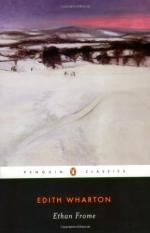The night was perfectly still, and the air so dry and pure that it gave little sensation of cold. The effect produced on Frome was rather of a complete absence of atmosphere, as though nothing less tenuous than ether intervened between the white earth under his feet and the metallic dome overhead. “It’s like being in an exhausted receiver,” he thought. Four or five years earlier he had taken a year’s course at a technological college at Worcester, and dabbled in the laboratory with a friendly professor of physics; and the images supplied by that experience still cropped up, at unexpected moments, through the totally different associations of thought in which he had since been living. His father’s death, and the misfortunes following it, had put a premature end to Ethan’s studies; but though they had not gone far enough to be of much practical use they had fed his fancy and made him aware of huge cloudy meanings behind the daily face of things.
As he strode along through the snow the sense of such meanings glowed in his brain and mingled with the bodily flush produced by his sharp tramp. At the end of the village he paused before the darkened front of the church. He stood there a moment, breathing quickly, and looking up and down the street, in which not another figure moved. The pitch of the Corbury road, below lawyer Varnum’s spruces, was the favourite coasting-ground of Starkfield, and on clear evenings the church corner rang till late with the shouts of the coasters; but to-night not a sled darkened the whiteness of the long declivity. The hush of midnight lay on the village, and all its waking life was gathered behind the church windows, from which strains of dance-music flowed with the broad bands of yellow light.
The young man, skirting the side of the building, went down the slope toward the basement door. To keep out of range of the revealing rays from within he made a circuit through the untrodden snow and gradually approached the farther angle of the basement wall. Thence, still hugging the shadow, he edged his way cautiously forward to the nearest window, holding back his straight spare body and craning his neck till he got a glimpse of the room.
Seen thus, from the pure and frosty darkness in which he stood, it seemed to be seething in a mist of heat. The metal reflectors of the gas-jets sent crude waves of light against the whitewashed walls, and the iron flanks of the stove at the end of the hall looked as though they were heaving with volcanic fires. The floor was thronged with girls and young men. Down the side wall facing the window stood a row of kitchen chairs from which the older women had just risen. By this time the music had stopped, and the musicians-a fiddler, and the young lady who played the harmonium on Sundays-were hastily refreshing themselves at one corner of the supper-table which aligned its devastated pie-dishes and ice-cream saucers on the platform at the end of the hall. The guests were




